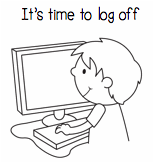 Yesterday at 1:35 I received a phone call from a second grade teacher, confirming that I was coming to her room at 1:50 to do a class lesson. I had three kids in my office and--because of the day I’d been having--no plan. Did I panic? Only on the inside. But it turned out to be my best lesson yet with this class, so I thought I’d share. For the past 5 weeks, I’ve been teaching these second graders about the Zones of Regulation. It was time to introduce the concept of the Size of the Problem. This particular room has more than its share of children who collapse on the floor rending their garments if someone else is chosen to be Line Leader. So here’s what I did: -Grabbed my trusty stack of index cards (if you stick with me you may want to buy some stock in index cards). On each of 18 cards I quickly jotted down a common kid-problem. This was easy, as all were--as they used to say at the beginning of L.A. Law--”ripped from the headlines” of daily life at PLS. I would have made more but, you know, time. I tried to achieve a rough balance between small problems, medium problems, and really big problems. Examples are below. -I took another 8 cards and wrote kids’ common reactions on each of those. Again, there was a range of sizes of reactions, from “Let it go” or “Say, ‘It’s no big deal’” to “Cry loudly” or “Hit someone.” For obvious reasons I did not include some of the less-common yet highly imaginative behaviors from my Counseling's Greatest Hits list, like "wet your pants whenever you hear the word 'no'" or "chase a classmate with a booger." -For the lesson, I read each problem card aloud and handed it to a student. If the student felt the problem was small, he’d stand by the cubbies. If it was medium, he’d move to the center of the room, and if it was large, he’d stand by the window. We all discussed whether we agreed with his choice, and had him change spots if indicated (here was where I realized the activity would work better with a smaller group, just because this took quite a bit of time, but it was still good). -After we finished that, all students with problem cards then moved to the rug with their cards, while I handed each of the remaining 8 a reaction card. I would choose one problem card child to stand and read his card to a reaction card child. The reaction card child would then act out whatever was written on her card. The kids LOVED this because sometimes it was so silly. Kid A: “You raised your hand, but the teacher called on someone else.” Kid B: (shrieks and kicks a chair) I made sure to create a couple of small problem/big reaction matches like the one above, as well as at least one big problem/small reaction combo (“Your uncle is in jail.” “It’s no big deal.”). Some of the others were appropriately matched. We'd decide whether each reaction was expected or unexpected when given the size of the problem. This turned out to be an effective way of demonstrating that 1) problems come in different sizes, 2) reactions also come in different sizes, 3) it’s pretty weird when the size of your reaction doesn’t match the size of the problem. In closing, I'd like to make a final, extremely important point. Please note that the size of my reaction (internal shrieking and swearing) totally matched the size of this problem, thus proving that I am not weird at all. Q.E.D. ***************************** Examples of problems (be careful that the big problems aren't a real-life issue for anyone in the group): You raised your hand but the teacher called on someone else; you’re stuck on a math problem; you just came back from Speech and you’re not sure what you should be doing; your uncle is in jail; your mom and dad are yelling at each other; your mom packed a kind of yogurt you don’t like; you didn’t get the red playing piece in the board game; no one will play with you; someone is sitting in the seat you wanted at lunch; your landlord is making you move out of your apartment; you have a substitute teacher; someone cut you in line; you fell and hurt your knee at recess; someone pushed you; your best friend is ignoring you (I could go on and on)... Examples of reactions: Let it go; break your pencil; ask for help; tell yourself, “It’s no big deal;” fix the problem yourself; throw yourself on the floor; cry loudly; use a calm-down strategy; tell how you feel; run out of the room, etc.
4 Comments
Kayla
1/2/2015 11:16:07 am
You're amazing for coming up with that on the fly! I love that idea and I know of quite a few of my own 2nd graders (and 3rd graders, and 4th graders) who could use this lesson. Thank you!
Reply
Laurie Mendoza
1/2/2015 10:36:56 pm
Thanks, Kayla! I don't know about your students, but mine love role-plays. Especially if there's an opportunity to be silly.
Reply
Mar
11/22/2015 03:15:09 pm
I laughed out loud when one of the things you listed was "you didn't get the red playing piece" I have a student who melts down over not getting red whatever it might be, all the time.
Reply
Laurie Mendoza
11/28/2015 08:56:04 am
I get it. Red is my favorite color playing piece too. :-)
Reply
Leave a Reply. |
Author
|

 RSS Feed
RSS Feed